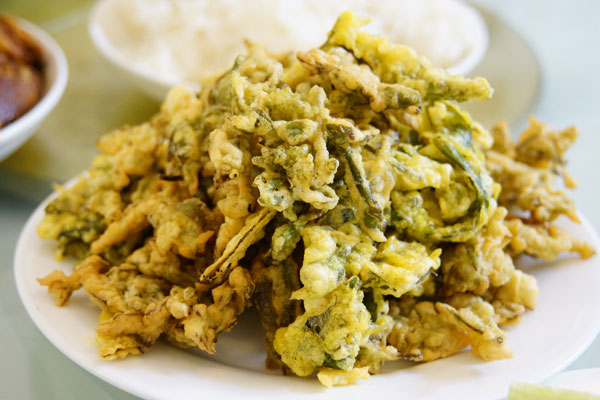

 |
|
Deep-fried Chinese pepper leaf is among typical country-style dishes. |
A day trip to an organic farm outside Beijing can restore your faith in the power of food, Ye Jun discovers.
Visiting an organic farm always makes me feel my food can be better. Especially so as I listened to Feng Bing, a technician with Noah Organic Farm, introduce the farm's way to grow organic vegetables.
Two friends and I were visiting the farm in northern Beijing's Ping'gu district. Feng first led us to an "optimal natural enemy" workshop, where they hatch and raise ladybugs, which will be put into greenhouses to kill pests.
That is only one of the natural ways they use to fend off pests at the farm. They also hang sticky colored cards to trap destructive bugs. Furthermore, they grow corn and beans at the side of the greenhouses, which are more attractive to pests, to lure them away from precious cherry tomatoes and cucumbers.
They also set up beehives in all the greenhouses: One can see bees humming their way around the blossoms of the tomato and cucumber plants.
Feng, an agriculture major back in university, says the cherry tomatoes they grow have clearly visible seeds in them, while many varieties available on the market do not. Only when the tomato flowers are pollinated will they have seeds. But many cherry tomatoes are not grown in such optimal conditions. The farm uses natural fertilizers for the cherry tomatoes, which makes the way to some of the greenhouses quite stinky. But it is a clear indication of their natural process.
According to Wang Chao, Noah Organic Farm's sales manager, the growers there can produce 75 kilograms of cherry tomatoes daily. They grow 30 to 50 varieties of vegetables depending on the season. Besides cherry tomatoes there are green bell peppers, cucumbers, aubergine and many leafy vegetables.
Noah Organic Farm now cultivates 47 hectares of its 80-hectare site. The farm has organic licenses for its vegetables from the European Union and Japan.
It runs on a membership basis. Members will tick what vegetables they want on an order sheet, and the produce will be delivered to their home. According to Wang, the farm now has 1,200 members. But its production capacity is able to meet demand from 2,000.
The farm's membership for a quarter of a year costs 4,250 yuan. That includes two deliveries of vegetables in a week, each with 3 kilograms of eight varieties. That comes out to a little more than 20 yuan per 500 grams of vegetables. Although it might seem a bit expensive, it is cheaper than the organic vegetables you find in supermarkets.
He says the farm does not encourage vegetable-picking by visitors. But people who are interested in becoming a member can contact him and come out to the farm for a look.
When you are visiting, you can try out a meal made with organic vegetables in the canteen.
They make a braised chicken and brown-braised pork belly slices out of chickens and pigs they feed. The chickens are raised in a very big range, where they have plenty of space to run about. Pigs are raised for at least a year, while most pork elsewhere goes to market in less than six months. Their sty looks clean and the pigs look strong and healthy.
Cherry tomatoes and cucumbers are served raw. They do smell and taste better than those you get in the vegetable market, and fried celery tastes much better here than anywhere else.
Some typical Chinese country-style dishes are fried leek, fried egg and deep-fried Chinese pepper leaf dipped in flour. Even steamed bread tasted better, because it was made with fresh flour produced by farmers.
Another highlight of the meal was the farm's fragrant and delicious homemade bean curd. The farm hires two experienced villagers to make bean curd in a simple mill. They first soak soybeans in water, and then grind the beans to make juice. The remains are soaked in hot boiled water and reground a second time.
They then boil the soybean juice to a seething point, and add brine to thicken the mixture so that it can take shape. The soybean juice was put in a clay urn, and an elderly woman poured in brine little by little, slowly stirring the juice to mix well.
The soy juice is left to cool down and thicken for another 15 minutes. After that, she and a coworker pour the bean curd onto a layer of gauze, and press it into a large cake shape on an iron shelf.
The whole process, if they don't stop in the middle, takes three and a half hours.
If you are planning a day trip to Beijing's outskirts, Noah Organic Farm offers a chance to learn about the whole organic growing process, and get a taste of organic vegetables. The farm has a children's playground. In summer it is a nice spot for an outdoor BBQ. The nearby village has a corn labyrinth one can take children to play in.
If traffic is good it takes an hour and a half to get to the farm from Beijing.
Contact the writer at yejun@chinadaily.com.cn.